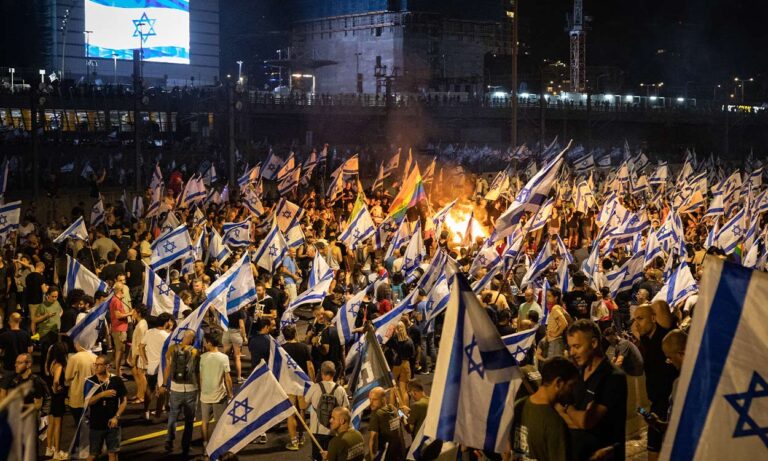Israel protests: Why millions fear the country is close to becoming a dictatorship

In March 2023, citizens took to the streets of Israel to protest against Prime Minister Benjamin Netanyahu’s plans to overhaul the nation’s justice system. Now, only four months later, civil unrest has recaptured the streets of Israel, as protesters once again demand the government to throw out some of the most divisive judicial reforms the country has ever seen.
Not only will these reforms destroy the little remaining autonomy the Supreme Court currently has, they will also directly put any and all marginalised communities at risk. Let’s first get into what exactly the reforms will mean for the country, and why it’s so important the protesters continue to fight for democracy.
On Monday 24 July, the ultra-religious and far-right Israeli government succeeded in having its extremely controversial judicial overhaul passed. Parliament voted 64-0, officially abolishing the “reasonableness” clause that allows Israel’s unelected Supreme Court to overrule government decisions.
For anyone unfamiliar with the details of the judicial reform, let us explain. Netanyahu has proposed reforms that will inherently help tighten his grip on Israel’s judicial capabilities. The new law will give the government decisive control over the committee which appoints judges, and would also make it harder for courts to remove a leader deemed unfit for office—aka, Netanyahu himself.
According to Al Jazeera, large crowds of protesters flooded Tel Aviv and Jerusalem with the hopes of partially restoring democracy and forcing the controversial Prime Minister to change his mind. However, these efforts currently seem quite futile.
On the other hand of course, there are also hoards of Israelis who are protesting in support of the reform. Polls have indicated that 46 per cent of Israelis were opposed to the amendment, 35 per cent were in favour and 19 per cent were undecided.
Netanyahu has a widespread international reputation for corruption, extremism, and an overall lack of respect for the democratic process. So naturally, the idea that his government will have unilateral control over the nation’s justice system is incredibly worrisome.
In their attempt to stop this from happening, some groups of citizens are going as far as to take industrial action, strategising that Netanyahu might cave if a key working sector stays stagnant and unattended to. For example, as reported by The Guardian, doctors have called for a 24-hour strike after the Israeli Medical Association came out with a statement that the judicial reforms would “devastate the healthcare system.”
Protesters have been met with water cannons and extreme hostility from Israeli authorities. Despite this, it looks as though the disruption is only just beginning. Alongside medical professionals, it’s also been reported that upwards of 10,000 military reservists are considering refusing to report for duty. If this kind of mass strike goes ahead, Israel could be facing the most drastic labour crisis it’s seen in quite some time.
One group who’ve helped to spearhead the current protests is the LGBTQIA+ community. With the judicial reforms passing in parliament, LGBTQIA+ individuals are at risk of facing extreme persecution and discrimination. Two queer organisations, The Aguda and Hoshan, stated in their campaign: “The State of Israel is speeding down a path of direct discrimination, and that is our red line. When the first stop is crushing the justice system, the next stops are cancelling the right to gay parenthood and allowing discrimination in businesses, just like what happened in Hungary and Poland.”
The organisations continued: “This is exactly the time for everyone to ask themselves where his red line cross—because when the legal revolution leaves the station, it will be very difficult to stop the violation of the rights we fought for years.”
In terms of how the rest of the global community has responded, the White House issued a statement on 24 July, calling it “unfortunate” that the Israeli parliament had ratified the reforms—a move that was definitely against President Joe Biden’s wishes.
Israel has also recently faced international condemnation for the extensive violence and strikes targeting the Palestinian people, particularly in the West Bank and Gaza. The recent controversial Jenin operation, which took place earlier this month, saw a systemic operation from the Israeli forces to try and weed out what they believed to be hidden weapons, explosives, and top operatives. The brutality continues to rise and it appears as though the conflict is still highly volatile.
Netanyahu appears unfazed by the mass protests flooding his streets, and from what we can see, his government doesn’t cave easily. Unfortunately, we might be looking at only the beginning of a lot of bloodshed and harm falling upon anyone who dares to try and express their outrage at this blatant erasure of democracy.





